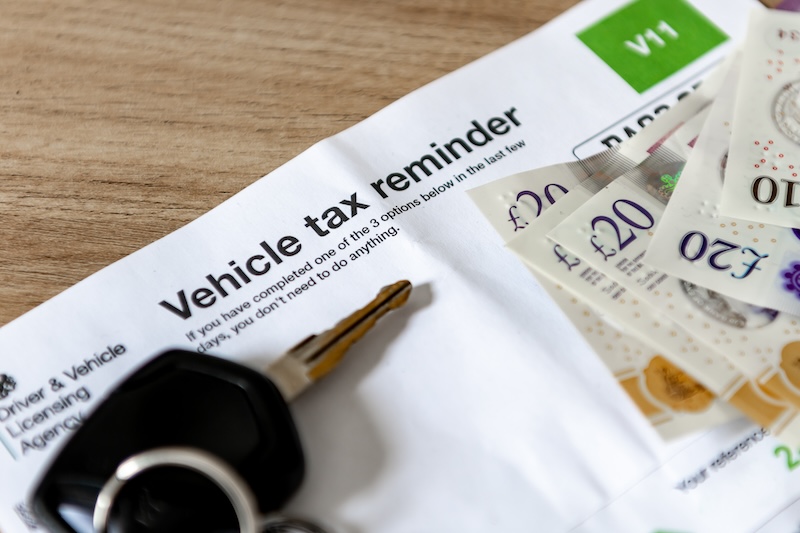Driving Law Changes in 2025
2025 will bring about a lot of changes for drivers in the UK. Check out our list to find out which ones will affect you.

Key Takeaways
Electric vehicle owners will pay road tax from 1st April 2025
New sight tests to be implemented by DVSA
Fuel Finder scheme introduced
Fuel duty freeze to continue
Electric vehicles are no longer exempt from congestion charges
Safety camera trials end
1. Changes to Electric Vehicle Road Tax
Electric vehicle (EV) owners are set to pay vehicle excise tax (VED) for the first time from 1 April 2025. VED, more commonly known as car tax, is determined by the age of your vehicle.
The rate for electric cars registered:
- On or after 1 April 2025 will be £10
- Between 1 April 2017 and 31 March 2025, £195
- Between 1 March 2001 and 31 March 2017, £20
Standard rates for other vehicle types are:
- £335 a year for vans
- £25 a year for motorbikes
In addition to this, EVs registered on or after 1 April 2025 will no longer be exempt from the Expensive Car Supplement, which applies to cars with a list price of over £40,000.
2. New sight test requirements may be introduced
The Driver and Vehicle Standards Agency (DVSA) has recently considered warnings from optometrists about the number of people who continue to drive despite their eyesight being below the legal standard.
The Association of Optometrists (AOP) is calling for the current law to be changed, requiring that all drivers have their vision checked when they first apply for a licence, when they get it renewed, and every three years after they turn 70.
Professor Julie-Anne Little, former chair of the AOP, stated: “Sight changes are gradual which means that many drivers are unaware that their vision has deteriorated over time. Having poor eyesight has been shown to slow reaction times and the ability to drive safely.”
While there’s no date set for when this change may come into effect, the DVSA is expected to publish their report on this matter in 2025.
3. New Fuel Finder scheme to be introduced
Formerly known as Pumpwatch, the Fuel Finder scheme will enhance fuel price transparency. All UK petrol stations will be required to report any changes to fuel prices or shortages within half an hour of them happening. This is to make sure drivers get the fairest possible deal on their fuel.
Expect to hear more on the scheme sometime in 2025.
4. Fuel duty freeze to continue
The Government has confirmed that the fuel duty freeze will continue as it is to March 2025 and until at least March 2026. The fuel duty freeze is to help alleviate the cost-of-living crisis.
Since January 2011, the fuel duty has been frozen to prevent it rising with inflation. The standard rate for petrol and diesel remains at 52.59 pence per litre.
5. End of Congestion Charge exemption for EVs
From 24 December 2025, the Congestion Charge exemption for EVs will cease. So far, drivers of EVs have been exempt from paying the £15 Congestion Charge in central London.
Driving within the Congestion Charge zone is free from 25 December to 1 January (inclusive) every year, so drivers of EVs will not actually have to pay the charge until 2 January 2026.
6. Safety camera trials end
Police forces have been working with National Highways to trial new technology that uses AI to catch drivers breaking the law. This includes those not wearing their seatbelt or those using a mobile phone while driving.
The tech was first introduced in 2021, and the latest trial will run until March 2025. The police are teaming up with the AI tech experts to help make roads safer. The system is designed to flag footage of drivers breaking the law and send it directly to the authorities.
7. VED rise
VED has been increasing with inflation since 2010. From April 2025, the first-year fee for petrol and diesel vehicles will see a substantial rise. The fees will increase on a sliding scale, based on CO2 emissions, with most higher tiers almost doubling in cost.
Models producing over 255g/km CO2 will face the highest increase of £2,745. This will affect some of the most popular brands on the market.
Check out our blog on the VED rise if you’d like more details.
FAQs
What are the new driving test rules in 2025?
Several changes are being introduced:
From 8 April 2025, learners must give 10 working days' notice to change or cancel a car driving test without losing the fee.
The rebooking period after failing a test increases from 10 to 28 working days.
Trials include reducing emergency stop exercises and adjusting independent driving sections
Is the UK introducing digital driving licences?
Yes. In 2025, the UK government will pilot digital driving licences via the GOV.UK Wallet app. These digital licences will supplement, not replace, physical ones and can be used for identity verification and age proofing.
What is the Zero Emission Vehicle Mandate starting in 2025?
From 1 January 2025, car manufacturers must ensure that at least 22% of new car sales and 10% of new van sales are fully electric. This mandate supports the UK's transition to greener roads and lower emissions.
Will AI speed cameras be introduced in 2025?
Trials for AI-powered speed cameras are ongoing in 2025, aiming to enhance road safety by detecting various driving offences more efficiently.
What are the changes to driving licence regulations for Ukrainian nationals?
The Motor Vehicles (Driving Licences) (Amendment) Regulations 2025 include provisions for Ukrainian nationals under specific schemes, allowing them to drive in the UK under certain conditions.